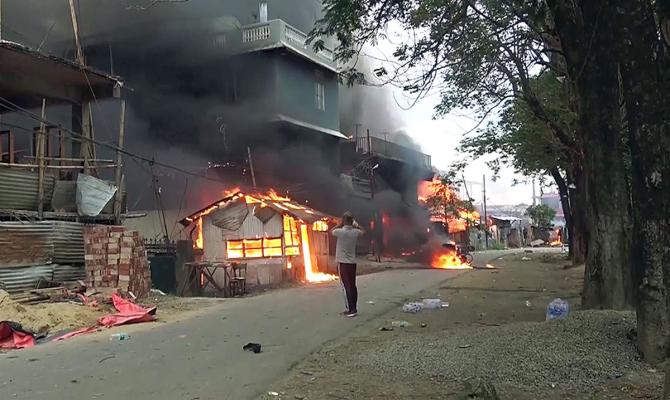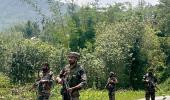There is the problem of regions in the North East being theatre for power-play by nations with borders and influences converging in those parts, which in turn requires a sizable presence of the armed forces, notes Shyam G Menon.

What happened in Manipur speaks much about us.
For two months, the state witnessed clashes. Many were killed. Many more, displaced. The situation became so grim that healing the wounds, observers believed, will take a long time.
There was talk of irreconcilable differences between the warring sides and a division of the state, as sole practical solution.
Others decried this as unwise; their logic rooted in the view that the state's hills and valleys exist because of each other and not despite.
Initially described as yet another case of the tribal rivalries and legacies of tribalism plaguing the North East, reports also painted the developments in hues ranging from the handiwork of select armed elements on both sides to being about land and, communal.
Those alleging the last as source have cited preparations and provocations on since months before the first major incident of May 2023.
The Indian media took time comprehending the actual causes for the Maitei-Kuki clashes.
At the few credible media outlets, unraveling the conflict is still a work in progress.
Each person interviewed has a viewpoint not necessarily agreeing in all aspects with other interviewees, pointing to what a storm one of India's smallest states, located in a strategic hotspot, managed to brew.
Among points recurring in media chatter were the need for dialogue, the presence of large amounts of arms and ammunition with the opposing groups (according to interviews published in the media, this included smuggled weaponry, legacy of the state arming people as means to check insurgency and arms secured by raiding state security forces) and the need to disarm such elements.
A glance through news reports from Manipur over the May-June period would also show the situation progressively getting out of hand.
For instance, in early May, there were reports of Kuki women forming a human ring to protect Meiteis from a mob in Churachandpur and Meiteis protecting Kukis in Manipur University.
Past mid-June there were news reports of women blocking roads and delaying intervention by the security forces.
We were left scrambling to comprehend the underlying currents and behavioral patterns.
Through all this, apart from some statements made and a visit to Manipur by Union Home Minister Amit A Shah, the Centre was relatively quiet.
To the amazement of the Indian public, the prime minister did not visit Manipur despite the scale of violence and the human tragedy in its wake.
He was instead seen doing yoga at the United Nations, seeking reforms at the UN, meeting the president of the USA, addressing a joint session of the US Congress, interacting with American business magnates and answering questions on India's democracy and its emergent track record in human rights at the White House.
It was as though the smoke spiraling up from Manipur and which was visible to all, didn't matter.
On June 26, the Press Trust of India reported BJP President J P Nadda telling the prime minister on his return to India from the US and Egypt that party cadres were reaching out to the people with the report card of nine years of the government and the country was happy.
It smacked of an administration viewing the world through its preferred optics and trapped in a closed-loop-greatness of its making.
It is a trademark of India's Right-Wing establishment and the friends it keeps (including in the Left).
So, nothing surprising there although Nadda's remarks (reported remarks as PTI quoted BJP leader Manoj Tiwari) stunned against the backdrop of Manipur.

As July dawned, it was clear that two layers of official administration -- the state and the Centre; both in the hands of the Bhartiya Janata Party -- had failed in Manipur.
The state's chief minister having his resignation letter torn up by his followers on June 30, stayed just that -- high drama.
Resonant in the recent violence were flashes of earlier news reports that built our picture of Manipur from far.
For long, life in Manipur has been a tightrope walk. Amidst the challenges of extremism and tribal politics, there have been extended blockades inspired by the tribal rivalries, the North East is notorious for.
There is the problem of regions in the North East being theatre for power-play by nations with borders and influences converging in those parts, which in turn requires a sizable presence of the armed forces.
Excessive military triggers its own set of complaints.
Juxtapose the current predicament of the state with the pictures of successive prime ministers in tribal attire and one is forced to hang one's head in shame.
What is the use of such symbolism if peace and coexistence can't be provided to people?
In the case of the BJP, we should have anticipated May-June's response (or lack of it) to Manipur; a phase contrasted by what else the authorities found time for.
Manipur wasn't the first instance of business as usual for the BJP government, against the backdrop of conflict.
Months earlier, when Ukraine was invaded, India fashioned an opportunistic and pragmatic policy of contracting Russian companies to supply us oil at attractive price.
It was lauded as a moment of maturity in Indian strategy and real politick although it involved a major trade in values.
The swings in the oil market caused by the invasion of one country (hosting some of the oil pipelines to Europe) by another (a major oil producer and supplier to Europe) and the difficulty faced by the invader thanks to economic sanctions slapped by the West, were tapped to import Russian crude to Indian refineries (China also imported more Russian crude).
Post-refining, Indian export of petroleum products to Europe and US, grew.
Smart strategy? Yes. Realpolitik? Yes. Great values? Arguably not.
It's a mercantile view of the world and resident in it is the willingness to weigh options and go for the one best suited for self-preservation, indifferent to a war dragging on unresolved.

Late June, even as Manipur continued a mess and the crisis in Ukraine continued unabated with a potential turning point -- the Wagner Group revolt -- snuffed out; the top leader of Russia praised the top leader of India.
It was partly, one guesses, due to the recently announced defence deals with the US, featuring local manufacturing but certainly because we proved to be a durable friend of Vladimir Putin's regime amidst sanctions by the West.
Perhaps it was just such a moment of limelight on the world stage that we saw in June's celebrations abroad around India and its leadership; including that spiel on democracy and human rights served to the media at the White House, followed in true new-India style by trolls censuring the journalist who posed the sensitive questions.
On June 27, NBC quoted John Kirby, the spokesman of the National Security Council of the US, describing the online harassment of the journalist as completely unacceptable.

On June 6, a month and three days after the violence in Manipur commenced, the depression that would eventually graduate to Cyclone Biparjoy, formed in the Arabian Sea.
Between then and its landfall in mid-June, the government evacuated thousands and ensured that no lives were lost post-landfall.
By early July, the flare-up in Manipur appeared to naturally exhaust like a cyclone after landfall but not before over 100 were killed and many more, displaced.
As of July beginning, the prime minister had still not visited Manipur.
But soon after returning from his foreign trip, he made sure to launch another five Vande Bharat trains and also caution against political parties helmed by families.
On July 1, the chief minister of Assam, often described as the BJP's point-man for matters North East, said that normalcy would be restored in Manipur in a week to ten days' time.
As per PTI's report, he didn't forget to bait the Congress (Rahul Gandhi had just visited Manipur), pointing out that the Opposition party was showing its concern after a relative peace had come to the state.
By then, the new Indian normal was also back in force. The drama around a minister in Tamil Nadu saw him dismissed by the governor with the move subsequently put on hold.
On July 1, the Hindustan Times quoted the governor as saying, 'The Prime Minister has set a divine mandate through his appearance, understanding the essence of Bharat and the power of its people.'
On July 2, in a repeat of what happened earlier with Uddhav Thackeray's Shiv Sena, prominent leaders of the Nationalist Congress Party crossed over to join the Maharashtra government headed by Eknath Shinde's Shiv Sena and the BJP. The NCP appeared broken.
Meanwhile, a WhatsApp group of hikers I was part of, saw a post sneak through seeking support for the BJP's latest rallying point -- the Uniform Civil Code.
It stayed visible for a while and was then deleted.
Shyam G Menon, is a freelance journalist based in Mumbai.
Feature Presentation: Aslam Hunani/Rediff.com










